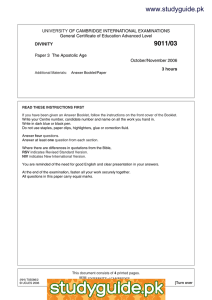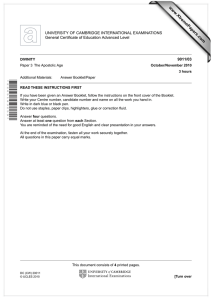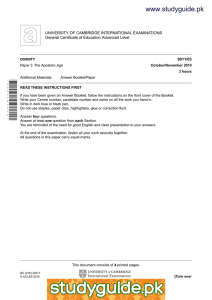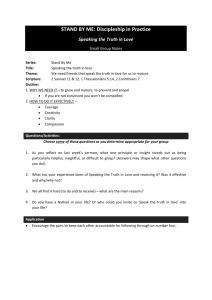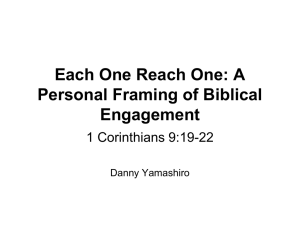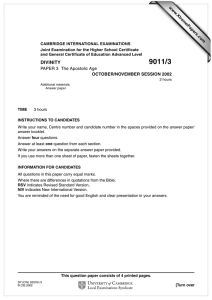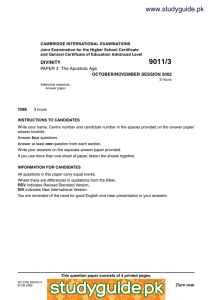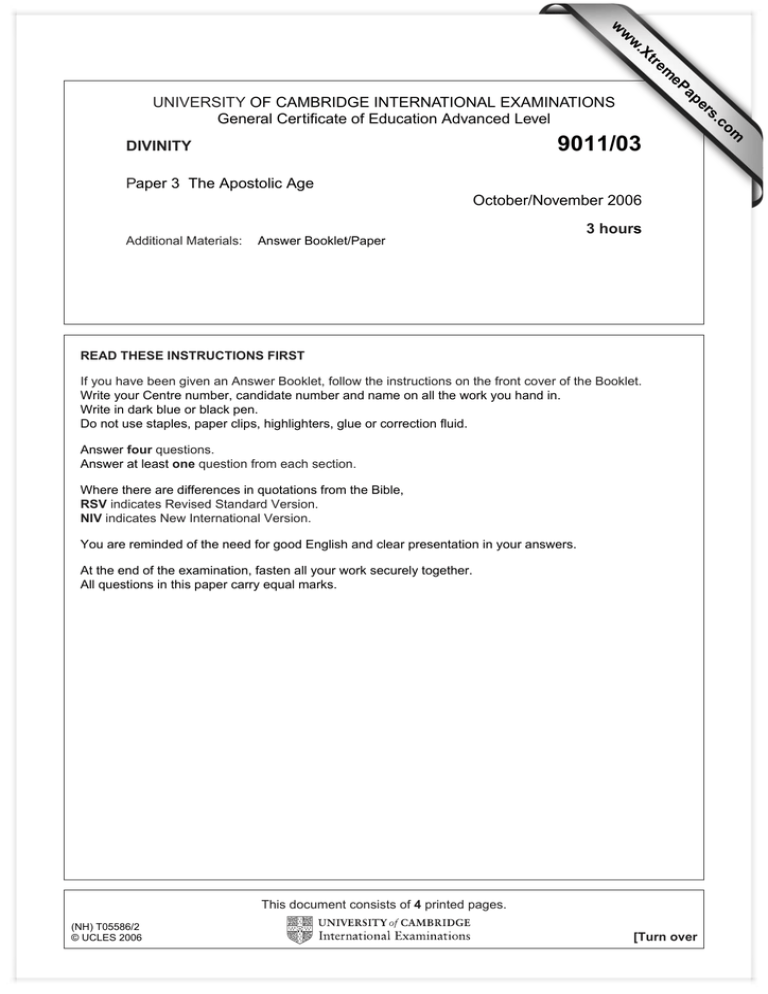
w
w
ap
eP
m
e
tr
.X
w
9011/03
DIVINITY
Paper 3 The Apostolic Age
October/November 2006
3 hours
Additional Materials:
Answer Booklet/Paper
READ THESE INSTRUCTIONS FIRST
If you have been given an Answer Booklet, follow the instructions on the front cover of the Booklet.
Write your Centre number, candidate number and name on all the work you hand in.
Write in dark blue or black pen.
Do not use staples, paper clips, highlighters, glue or correction fluid.
Answer four questions.
Answer at least one question from each section.
Where there are differences in quotations from the Bible,
RSV indicates Revised Standard Version.
NIV indicates New International Version.
You are reminded of the need for good English and clear presentation in your answers.
At the end of the examination, fasten all your work securely together.
All questions in this paper carry equal marks.
This document consists of 4 printed pages.
(NH) T05586/2
© UCLES 2006
[Turn over
om
.c
s
er
UNIVERSITY OF CAMBRIDGE INTERNATIONAL EXAMINATIONS
General Certificate of Education Advanced Level
2
Section A
Answer at least one question from this section.
If you choose question 1, answer in one version only.
1 Corinthians and 1 Thessalonians
REVISED STANDARD VERSION
1
Comment on points of interest or difficulty in four of the following, with brief reference to the
general context:
(a) What I mean is that each one of you says, “I belong to Paul,” or “I belong to Apollos,” or “I
belong to Cephas,” or “I belong to Christ”.
(1 Corinthians 1:12)
(b) Do you not know that you are God’s temple and that God’s Spirit dwells in you?
(1 Corinthians 3:16)
(c) Am I not free? Am I not an apostle? Have I not seen Jesus our Lord? Are not you my
workmanship in the Lord?
(1 Corinthians 9:1)
(d) The first man was from the earth, a man of dust; the second man is from heaven. As was the
man of dust, so are those who are of the dust; and as is the man of heaven, so are those who
are of heaven.
(1 Corinthians 15:47–48)
(e) For this reason, when I could bear it no longer, I sent that I might know your faith, for fear that
somehow the tempter had tempted you and that our labour would be in vain.
(1 Thessalonians 3:5)
(f)
Do not quench the Spirit, do not despise prophesying, but test everything; hold fast what is
good, abstain from every form of evil.
(1 Thessalonians 5:19–22)
© UCLES 2006
9011/03/O/N/06
3
NEW INTERNATIONAL VERSION
1
Comment on points of interest or difficulty in four of the following, with brief reference to the
general context:
(a) What I mean is this: One of you says, “I follow Paul,” another, “I follow Apollos,” another,
“I follow Cephas,” still another, “I follow Christ”.
(1 Corinthians 1:12)
(b) Don’t you know that you yourselves are God’s temple and that God’s Spirit lives in you?
(1 Corinthians 3:16)
(c) Am I not free? Am I not an apostle? Have I not seen Jesus our Lord? Are you not the result of
my work in the Lord?
(1 Corinthians 9:1)
(d) The first man was of the dust of the earth, the second man from heaven. As was the earthly
man, so are those who are of the earth; and as is the man from heaven, so also are those
who are of heaven.
(1 Corinthians 15:47–48)
(e) For this reason, when I could stand it no longer, I sent to find out about your faith. I was afraid
that in some way the tempter might have tempted you and our efforts might have been
useless.
(1 Thessalonians 3:5)
(f)
Do not put out the Spirit’s fire, do not treat prophecies with contempt. Test everything. Hold on
to the good. Avoid every kind of evil.
(1 Thessalonians 5:19–22)
2
How serious were the problems concerning Christian conduct which Paul had to deal with in the
church at Corinth?
3
How far is it possible to reconstruct the main points of the gospel Paul preached from 1 Corinthians
and 1 Thessalonians?
4
Discuss the authorship, date and purpose of 1 Thessalonians.
© UCLES 2006
9011/03/O/N/06
[Turn over
4
Section B
Answer at least one question from this section.
5
How far do the contents of Acts reveal the distinctive interests and purpose of the author?
6
Compare Paul’s attitude to the Law as described in Acts with his teaching about the Law in
Galatians.
7
Assess the strength of the arguments against the Pauline authorship of Colossians.
8
Either
(a) Compare the teaching on faith and works in Romans and James. What light, if any, does this
comparison throw on the reasons why James was written?
Or
(b) Compare the meaning and importance of faith in Hebrews and James.
9
How is the universal and cosmic significance of the work of Christ presented in the epistles
studied for this paper?
Copyright Acknowledgements:
Scripture quotations marked (RSV) are from the Revised Standard Version of the Bible, copyright © 1946, 1952 and 1971 by the Division of Christian Education
of the National Council of the Churches of Christ in the USA. Used by permission. All rights reserved.
Scripture quotations marked (NIV) are taken from the HOLY BIBLE, NEW INTERNATIONAL VERSION®. NIV®. Copyright © 1973, 1978, 1984 by International
Bible Society. Used by permission. All rights reserved.
Permission to reproduce items where third-party owned material protected by copyright is included has been sought and cleared where possible. Every
reasonable effort has been made by the publisher (UCLES) to trace copyright holders, but if any items requiring clearance have unwittingly been included, the
publisher will be pleased to make amends at the earliest possible opportunity.
University of Cambridge International Examinations is part of the University of Cambridge Local Examinations Syndicate (UCLES), which is itself a department of
the University of Cambridge.
© UCLES 2006
9011/03/O/N/06

